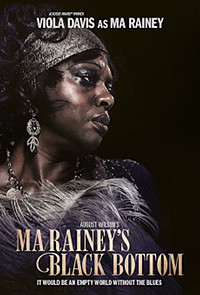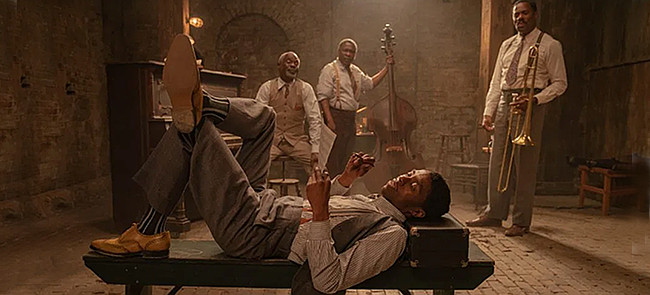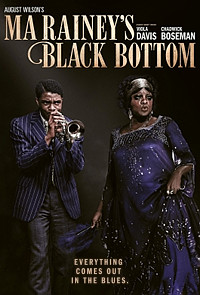| SHADOWS ON THE WALL | REVIEWS | NEWS | FESTIVAL | AWARDS | Q&A | ABOUT | TALKBACK | |||||
|
Ma Rainey’s Black Bottom
Review by Rich Cline |
| |||||
 dir George C Wolfe scr Ruben Santiago-Hudson prd Dany Wolf with Viola Davis, Chadwick Boseman, Glynn Turman, Colman Domingo, Michael Potts, Jonny Coyne, Taylour Paige, Jeremy Shamos, Dusan Brown, Joshua Harto, Quinn VanAntwerp, Gregory Bromfield release US/UK 18.Dec.20 20/US Netflix 1h34 


Is it streaming? |
 Based on August Wilson's acclaimed play, this lively story is packed with sparky characters and pungent observations. Stagey in its approach, the film is both talky and performed at a heightened level. This undermines the power in the words, as director George Wolfe resists subtlety to make sure the audience gets the point. Thankfully, the message is vitally important, even if the film is rarely more than one note. In 1927 Chicago, an eclectic group of African-American musicians, with trumpeter Levee (Boseman) alongside Cutler, Toledo and Slow Drag (Domingo, Turman and Potts), are hired for a recording session with the famed Ma Rainey (Davis), a jaded diva from Georgia. Producers Irving and Sturdyvant (Shamos and Coyne) are determined to control things, but Levee doesn't want to play just anything. And when Ma arrives with her entourage, she insists that the record is introduced by her stuttering nephew (Brown). So recording becomes a challenge as tensions rise among the band members, the producers and Ma herself. The patter between bandmates bristles with humour that has sharp political edges, revealing characters through back-stories that feed into the bigger picture of systematically oppressed Black culture. Wilson's writing is careful to keep these things personal, which makes them much stronger, while Wolfe punches every theme with deliberate intensity. This leads to clashes between most of the characters that spring from gruelling anecdotes about how badly they've been treated by White-dominated society. Davis is larger-than-life as the unapologetic Ma, utilising costumes, makeup and musicality in a hugely expressive role. A finely committed actor, Boseman of course has terrific presence as the preening horn player, talking a lot of bravado then carefully showing deference when a White man's around. But he also picks fights with everyone, and Boseman plays his internal turmoil with so much incandescent pain that it's easy to see why Levee fails to correctly pick his battles. Thurman and Domingo offer particularly strong support in side roles. The fiery young Levee is determined to make White men respect him, but the older guys are understandably more grounded, waiting to find out, as Turman's Toledo says, "what's a coloured man gonna do with himself". A more nuanced filmmaking approach might have unearthed more powerful resonance in the way these talented musicians are used and sidelined by a system designed to take advantage of their blinding skill. But Wolfe doesn't let the ideas linger, instead pounding them loudly. They're great points, and a film should force us to grapple with them.
R E A D E R R E V I E W S 
 Still waiting for your comments ... don't be shy.
Still waiting for your comments ... don't be shy.
|
||||
© 2020 by Rich Cline, Shadows on the Wall | |||||
| HOME | REVIEWS | NEWS | FESTIVAL | AWARDS | Q&A | ABOUT | TALKBACK | |||||

